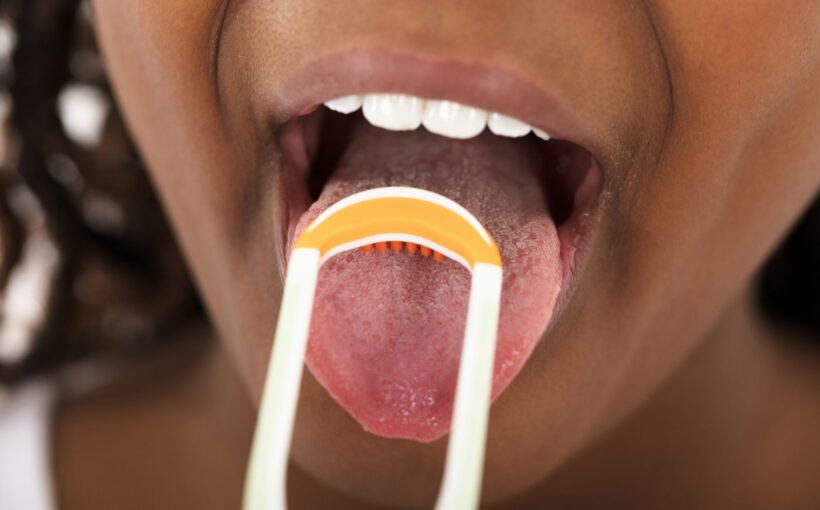
Most of us know how important it is to brush and floss if we want a healthy smile. But some people on TikTok are suggesting that this isn’t enough – and that if you really want good oral health, you need to use a “tongue scraper”.
Tongue scraping has long been part of daily hygiene routines in many parts of the world. It involves running a hard instrument across the tongue to remove bacterial build-up and debris. Tongue scrapers come in all shapes and sizes – with some people even using their toothbrush. They remove the white coating (which contains bacteria) that builds up on the back of some people’s tongues.
Videos on social media of people advocating for the use of tongue scrapers have amassed millions of views. Many proponents claim the practice banishes bad breath. But while there’s some evidence to back these claims, the practise could also come with risks.
Everyone has communities of bacteria, fungi and even viruses living inside their mouth. This is known as your oral microbiome. These bacteria can stick to the surface of your tongue and teeth and build up in layers (known as a biofilm). Plaque is one example of a biofilm.
Poor oral health can lead to a build-up of biofilms containing certain bacterial species which cause dental decay (cavities), gum disease and bad breath. For example, a build-up of the bacteria Streptococcus mutans is associated with cavities, while a build-up of volatile sulphur compound producing bacteria (VSCs) on the tongue and gums can cause bad breath. Diets high in sugar and low in fibre can also contribute to the build-up of VSCs.
For most, brushing your teeth twice daily (for two minutes each time) and using floss or interdental brushes to clean between teeth will be enough to remove the build-up of these biofilms. These techniques are also very effective for preventing tooth decay and gum disease.
But there’s less evidence showing whether these techniques are also effective for preventing tongue biofilms and bad breath.
Tongue scraping
A couple of reviews have shown that tongue scrapers can reduce the release of VSCs produced by the bacterial species found in the tongue’s biofilm. Tongue scrapers are also shown to be superior to a toothbrush for reducing bad breath.
So, based on the limited evidence out there, it does seem that regularly using a tongue scraper may help remove biofilms and improve bad breath. However, these reviews did find that the benefits of tongue scraping were shortlived and needed to be done using a specific technique to be effective.
Scraping your tongue once or twice a day for around 15-30 seconds is adequate. You also need to ensure you get far enough back on the tongue (where VSC-producing bacteria live), scrape back to front and keep up your regular tooth-brushing routine for the practise to be effective.
There are other caveats when it comes to tongue scraping. Bad breath isn’t only caused by VSCs. It can also be caused by cavities, tonsillitis and even stomach problems (such as acid reflux). In these instances, tongue scraping will do little to solve bad breath.

And despite their bad press, we actually need certain bacteria for good health. For example, nitrate-reducing bacterial species living on the tongue convert nitrate from the foods we eat (such as green leafy vegetables) to nitrite. This mechanism is important, since we swallow the nitrite that’s produced. The nitrite is then converted in the gut to nitric oxide, which relaxes our blood vessels and keeps blood pressure lower.
One study has suggested that tongue scraping may actually enrich the amount of nitrate-reducing bacteria on the tongue. However, this study was only conducted using a sample of 27 people, the majority of whom were dental hygiene students. It will be important for further research to be done with more participants to better determine both the potential benefits and harms of tongue scraping.
Should I use a tongue scraper?
A qualified dentist would find it difficult to strongly advocate the use of tongue scrapers, due to the limited evidence supporting their use. It’s also likely that the benefits and downsides of using a tongue scraper would differ for each person. A check-up would probably be necessary before a dentist could advise – especially so they can ensure a white tongue coating isn’t due to another more serious condition, such as oral thrush or oral cancer.
Not everyone gets a tongue biofilm, either. Only around 10% of the people develop a thick tongue coating. For these people, removing this thick layer can help counter bad breath.
For others, a thick tongue biofilm may only happen at certain times – for example, during periods of illness, stress, with hormone changes, or if they change their diet. So for them, a tongue scraper may only be occasionally beneficial.
If there’s no white coating present at all, there doesn’t seem to be much point using a tongue scraper. Good oral hygiene will probably be enough to fix bad breath – and aggressive tongue scraping may actually risk making your tongue bleed. We also don’t yet fully know how tongue scraping will affect good bacteria on you tongue.
Anecdotal TikTok videos should not drive your healthcare decisions (especially if those videos haven’t been fact-checked). But in this case, TikTok may be highlighting an area where we need to do more research to better help peoples’ oral health. Producing strong evidence that tongue scrapers really do work (or don’t work), through good quality clinical studies, could lead to a change in UK guidelines in the future.
But until we know more, keep brushing your teeth twice daily for two minutes with a fluoride toothpaste and clean between your teeth with floss. Scrape your tongue, or clean your tongue with a toothbrush, with care, if you must.
![]()
Zoe Brookes does not work for, consult, own shares in or receive funding from any company or organisation that would benefit from this article, and has disclosed no relevant affiliations beyond their academic appointment.



